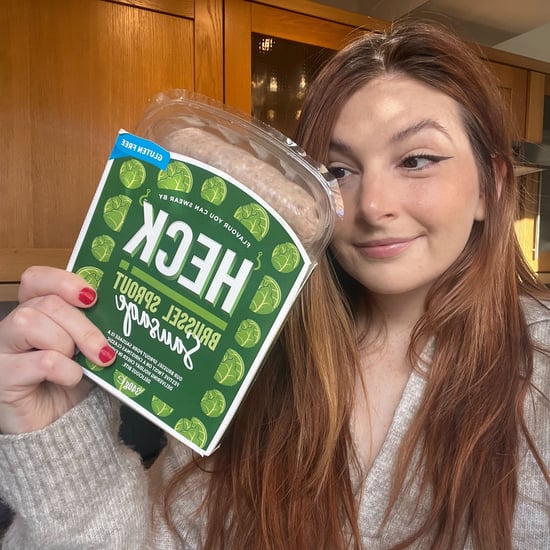Does Semen Have Protein?
Christina Aguilera Says Semen Has "a Lot of Protein," but Does It Really?

From being more direct with your partner about what you want to living out a longtime fantasy, sexual exploration can do wonders for intimacy, confidence, self-exploration, and overall well-being. It's something that Christina Aguilera is actively championing these days with the launch of her new sexual wellness company, Playground. In a recent interview on the the Call Her Daddy podcast promoting the brand, Aguilera emphasised the importance of being "with a partner where you can really explore." Specifically, in reference to oral sex exploration, she noted she believes that "there is something to be said after you put in the hard work . . . I think swallowing is really, you know, a good thing . . . and it's got a lot of protein."
Aguilera isn't the first to call out swallowing as something that can bolster pleasure for both parties — or the first to claim that semen has nutritional value.
"It seems like every few years there's a renewed interest in the nutritional value of semen, usually resurrected by a social media trend, a clip gone viral, or a salacious, click-baity news headline," notes Joshua Gonzalez, MD, a board-certified urologist and Astroglide's sexual health adviser. "As a culture, we also seem to have an almost obsessive interest in semen — from what it does to what it tastes like. Just think of all the references in popular culture related to semen (à la the infamous 'funky spunk' episode of 'Sex & the City')."
Kiana Reeves, AASECT-certified somatic sex educator and chief content officer at Foria, attributes the waves of interest in ejaculate's health benefits to our current "goal-driven times." "It seems like everyone's looking for a concrete 'good reason' to do things — like there has to be an immediate, tangible, quantifiable benefit we can point to in order to justify making a choice," she notes. "That's true even when it comes to sex. So it may be that people want hard numbers on the 'wellness benefits' of consuming semen to justify it to themselves — or talk themselves into it, even when they don't want to do it."
At this point, the idea that semen has protein has also become a bit of a running joke — so even if people like Aguilera don't wholeheartedly believe it to be true, it could be thrown into an interview like this just for a laugh or to diffuse any awkwardness around talking about sex.
Whether you're super ambitious or simply fascinated by semen, don't start skipping those post-workout protein shakes. "From a medical standpoint, there is really no nutritional or otherwise health benefit to swallowing semen," Dr. Gonzalez says. Let's clear up why not once and for all.
Does Semen Have Protein?
So how much protein is in semen, really? "The amount of protein in semen is pretty trivial," Dr. Gonzalez says. The TL;DR? Swallowing ejaculate won't contribute in any significant way toward your recommended daily protein intake.
He breaks it down: A study in the Journal of Andrology concluded that 100ml of semen contains 5 grams (or 5,000 mg) of protein. However, "A normal ejaculation is typically 2-5 ml," says Dr. Gonzalez. "That means there's about 250mg (or 0.25g) of protein in 5ml (or about one teaspoon of semen)."
For context, the BHF recommends that adults consume about 45 grams of protein per day as part of a 2,000-calorie diet. Swallowing a typical amount of ejaculate is not even going to make the slightest dent in that requirement.
What About Other Semen Nutrition Facts?
As for the calories in semen? That same teaspoon of semen also contains only a small amount (5-20) calories, which is made up of what Dr. Gonzalez refers to as "a buffet of ingredients." The primary components of semen, according to Justin Houman, MD, a board-certified urologist in Los Angeles and senior medical adviser to Hello Cake, are as follows:
- Sperm cells: the reproductive cells produced by the male reproductive system.
- Water: makes up the majority of semen's volume.
- Various proteins: including enzymes, enzyme inhibitors, and other proteins that are involved in sperm function and reproductive processes.
- Fructose: a type of sugar that provides energy for sperm cells.
- Ascorbic acid (vitamin C): which is an antioxidant that helps protect sperm cells from oxidative damage.
- Minerals: such as zinc, calcium, and magnesium, which are important for sperm production and function.
Given ejaculate's stores of vitamin C, it's also been touted as a magical immune booster. But Dr. Gonzalez is myth-busting "pervasive rumours" that semen contains as much vitamin C as an orange. "There's just no evidence that the orange claim is true," he notes. Dr. Houman agrees, adding, "The amount of vitamin C in semen is relatively small, and it is not considered a major dietary source of this vitamin. The exact amount of vitamin C in semen can vary, but it is typically present in trace amounts."
The only nutrient that ejaculate might deserve a tiny bit of credit for providing is the mineral zinc. Dr. Gonzalez says you can get around 3 percent of your recommended daily allowance of the trace mineral in one teaspoon — but really, you're better off eating zinc-rich foods like chicken, peanuts, beef, or hummus.
The Takeaway on the "Benefits" of Swallowing Semen
The bottom line: none of the components of this "buffet" are enough to make semen a good source of any particular nutrient — and that includes protein.
That said, if you actually want to prioritise adequate protein in your diet, aim for 0.36 grams of it per pound of body weight, according to the National Institutes of Health. The best sources are eggs, almonds, Greek yoghurt, cottage cheese, chicken and/or turkey breast, lean beef, fish, lentils, and quinoa, says Dr. Gonzalez. "That list allows for people with various dietary preferences and restrictions (from plant-based folks to pescatarians)," he says.
You'll notice, one thing not on that list is semen, notes Dr. Gonzalez, who cheekily concludes that anyone looking to bolster their protein intake — and overall healthy diet — will need to look outside the bedroom.
Inside the bedroom, Reeves encourages people to ask themselves: "Does swallowing make me feel closer and more bonded with my partner? Does it feel transgressive in a hot way, or coercive and degrading?" she says. "Those questions themselves can be the 'essential nutrients' for knowing and understanding each other better, and building trust and empathy — so much more valuable than a few trace minerals."








